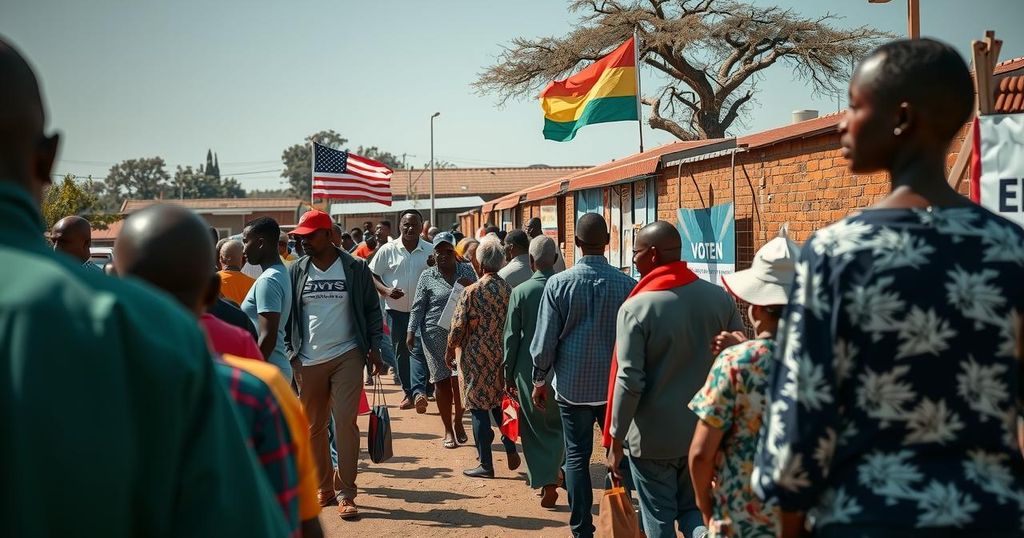World news
AFRICA, ASSOCIATED PRESS, CENTER, DEMOCRACY, ELECTORAL COMMISSION OF NAMIBIA, ELSIE NGHIKEMBUA, FRELIMO, GOVERNANCE, GOVERNMENT, MOZAMBIQUE, NAMIBIA, NANGOMBE SHITALENI, NET, NETUMBO NANDI - NDAITWAH, NORTH AMERICA, OKANDJENGEDI, OPPOSITION, POLITICS, SWAP, SWAPO, UNITED STATES, WINDHOEK
Ethan Kim
0 Comments
Namibia Extends Election Voting Amid Ballot Issues, Sparks Opposition Claims
Namibia has extended voting for its elections due to ballot shortages, prompting allegations of illegality from the opposition. The decision highlights growing frustrations within the electorate, particularly among young voters, against the backdrop of ongoing economic challenges and historical governance issues. The extension raises concerns about the integrity of the electoral process amid a backdrop of unrest in the region.
Namibia’s electoral office has decided to extend the voting period for the presidential and parliamentary elections into the weekend due to logistical challenges and a shortage of ballot papers. Originally scheduled to conclude on Wednesday, polling stations will now remain open until Saturday night, following reports of some stations running out of ballots. The opposition party, Independent Patriots for Change, has deemed this extension illegal and raises concerns of potential election fraud.
The tensions in Namibia’s election context come against a backdrop of unrest in neighboring Mozambique, where accusations of vote rigging have led to violent protests after the ruling party was declared the winner in an October election. Netumbo Nandi-Ndaitwah, the ruling SWAPO party’s presidential candidate and Namibia’s Vice President, could become the first female leader if successful in this election. However, she encounters significant opposition from a youthful electorate dissatisfied with economic opportunities in this mineral-rich nation, categorized by the World Bank as an upper-middle-income country but marked by stark inequalities.
As of Friday afternoon, many voters had yet to cast their ballots, with reports of lengthy waiting lines at polling stations. Electoral officials reassured voters that additional ballots were being dispatched, yet skepticism remained prevalent among the populace. Some voters, like Nangombe Shitaleni, expressed frustration over their repeated attempts to vote without success, likening their situation to madness.
Approximately 1.4 million citizens—representing nearly half of Namibia’s population—are registered to participate in this election, which will determine the president and parliamentary leaders for a five-year term. Namibia, emerging from a German colonial past and later South African control, has historically been regarded as one of Africa’s most stable democracies due to credible elections. However, the long-standing governance of SWAPO, in power since the nation’s independence in 1990, faces growing criticism amid high unemployment and economic distress, especially among the youth, prompting a shift in voter sentiment across southern Africa.
Namibia’s electoral landscape is currently marked by discontent and challenges as it conducts its presidential and parliamentary elections. The country’s electoral agency announced an extension in voting due to technical issues related to ballot paper shortages, a decision contested by opposition parties. The context of these elections is complicated by similar electoral tensions in neighboring nations, raising concerns about governance and the democratic process in southern Africa, particularly among the younger generation looking for reform and new opportunities.
In summary, Namibia’s recent decision to extend voting due to ballot shortages has sparked allegations of illegitimacy and fraud from opposition parties. The electoral challenges resonate with broader regional dynamics, as citizens express frustration over governance and socioeconomic disparities. As the nation approaches a pivotal decision point in its political history, the implications of this election could shape the future of its democracy, lifting the veil on citizens’ expectations and the ruling party’s responsiveness to change.
Original Source: abcnews.go.com




Post Comment